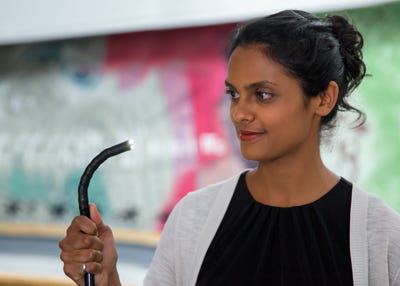This New Coating Could Take Endoscopes to the Next Level
September 29, 2016
Researchers at Harvard's Wyss Institute have developed a new antifouling surface coating for endoscopes that could help keep blood and other body fluids clear from the lens and reduce camera obstruction.
Kristopher Sturgis
|
Joanna Aizenberg (Image courtesy of Wyss Institute at Harvard) |
One of the largest complications with camera-guided endoscopes is avoiding the buildup of blood and other bodily fluids around the camera lens, which can often obstruct the view during many critical procedures. In an effort to solve the issue, researchers from the Wyss Institute at Harvard have created a novel transparent surface coating designed to keep blood and other bodily fluids away from the camera as it is guided throughout the body.
For years endoscopes have been used to provide doctors and clinicians with a means to see inside the body to diagnose and treat a variety of different conditions. Over 20 million endoscopic procedures are performed each year in the U.S. alone, from procedures in the stomach, intestines, and colon to endoscopic procedures performed during pregnancy and surgery.
"Endoscopes are used by many physicians around the world for a variety of procedures, and ironically, the moment when bleeding occurs and the optical field is blocked is also precisely when physicians most need to see what's happening," says Joanna Aizenberg, PhD, the Harvard material sciences professor who led the Wyss research team.
To try and address the issue, the group turned to SLIPS (Slippery Liquid Infused Porous Surfaces) technologies, a former project at the institute designed to develop specialized coating substances that could repel blood and bacteria. The group aimed to adapt the SLIPS technology for endoscopic use by tailoring it to survive the harsh conditions of the human body. This meant they needed a substance that was transparent--so that it could coat the surface of the lens without obstructing view--and also be able to withstand the constant contact of soft tissue and corrosive human bodily fluids.
To bridge this gap, the group decided to work with silica nanoparticles and deposit them layer by layer onto the glass camera lens of an endoscope to create a porous surface. This porous surface would then be infused with a medical-grade silicone oil to create a self-replenishing liquid layer that could not only endure multiple procedures, but also the standard sterilization procedures that endoscopes go through between uses.
The team recently began testing the antifouling endoscope in vivo in bronchoscopy, a procedure performed on patients with pathological lung conditions. They decided to test the effectiveness of the new SLIPS coating an anesthetized pig by performing a bronchoscopy procedure with one of their modified endoscopes coated with the new material. The lens proved able to repel blood and mucus from start to finish, providing unprecedented clarity that saved time and reduced the overall complexity of the procedure.
With conventional scopes requiring repeated breaks to stop and clean the lens to wipe away blood and fluids, the new coating material could prove to be rather revolutionary for a procedure so widely used in the world of medicine. As the group moves forward with their research they intend to explore other uses for their slippery lens coating in other instruments that require an unobstructed optical field such as robotics, marine exploration, and pipe maintenance.
However, for now, they plan to continue to refine the technology in an effort to make endoscopic procedures easier for clinicians, as well as improve patient treatment and procedural outcomes.
Kristopher Sturgis is a contributor to Qmed.
Like what you're reading? Subscribe to our daily e-newsletter.
About the Author(s)
You May Also Like



